Published April 2, 2025. This post may contain affiliate links. Please read my disclosure policy.
This beginner-friendly Marinara Sauce Recipe transforms a handful of simple ingredients, like olive oil, canned tomatoes, garlic, onion, and herbs, into a rich and flavorful sauce from scratch. It’s the ultimate tomato sauce I love to pair with pasta, spread on pizza, use for dipping, and more.
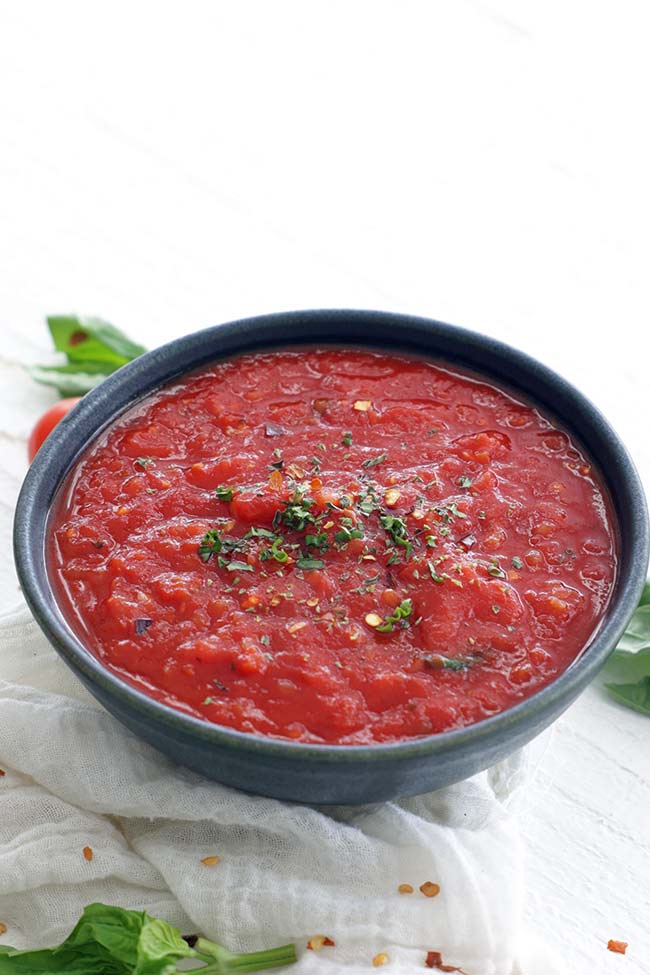
I wouldn’t be Italian without always having a few tomato sauce recipes in my back pocket. Marinara sauce is one of the most popular sauces since it quickly turns less than 10 everyday ingredients into something well-balanced and versatile. Whether you’re a beginner home cook or want to experiment with homemade pasta sauces, marinara is the best place to start.
What is Marinara Sauce?
Classic marinara sauce is a simple tomato sauce made with minimal ingredients, like San Marzano tomatoes, fresh garlic, olive oil, basil leaves, and salt. It’s quick to make, light, and packed with garden-fresh flavors, making it a staple in Italian cooking. I like it best with homemade pasta, but it’s also a great fit spooned over Italian sausage and peppers or served as a dipping sauce for calamari and other appetizers.
Unlike heavier tomato-based sauces, such as spaghetti sauce and ragù (which often include meat, wine, and additional aromatics), traditional marinara is meant to complement, not overpower, the dish. This is why it’s an excellent fit for pasta, chicken, seafood, and many other main dishes.
Every time I make marinara sauce, I try to make a double batch so I have extras to refrigerate or freeze for later. It always comes in handy, no matter the meal or occasion!
Ingredients and Substitutions
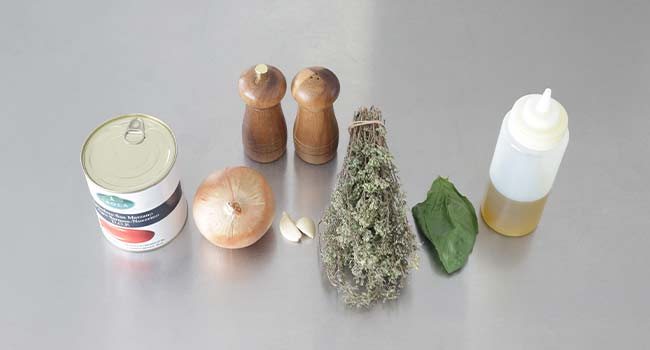
- Oil – A good-quality extra virgin olive oil is my top pick for this delicate sauce. It’s used to sauté the aromatics and give the sauce a nice body.
- Aromatics – I slowly sauté minced garlic and finely diced yellow onion in olive oil to release their natural sweetness and create a rich base for the sauce. If you’re out of yellow onions, use shallots or sweet onions instead.
- Tomatoes – High-quality canned tomatoes, like San Marzano tomatoes, are the best for homemade tomato sauces (other than fresh tomatoes). They’re naturally sweeter, less acidic, and have fewer seeds than other varieties.
- Herbs – I used fresh basil to infuse the sauce with a distinct Italian aroma. It’s optional, but I also like adding a generous pinch of dried oregano for extra depth of flavor.
How to Make Marinara Sauce
Sauté: First, I heat the olive oil in a medium-sized saucepan over low-medium heat, then add the garlic, onions, and a pinch of salt. I sauté the aromatics until they’re soft and lightly golden.
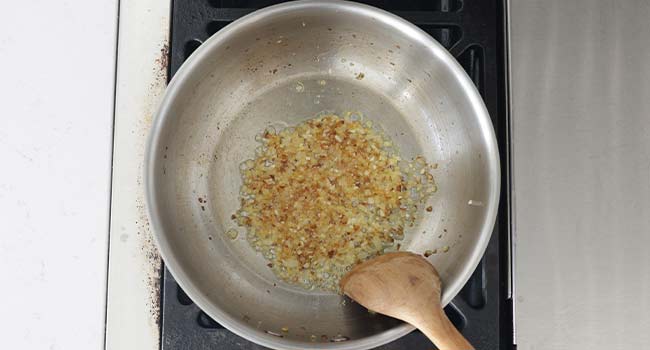
Add: Next, I add the hand-crushed tomatoes, fresh basil leaves, oregano, and salt.
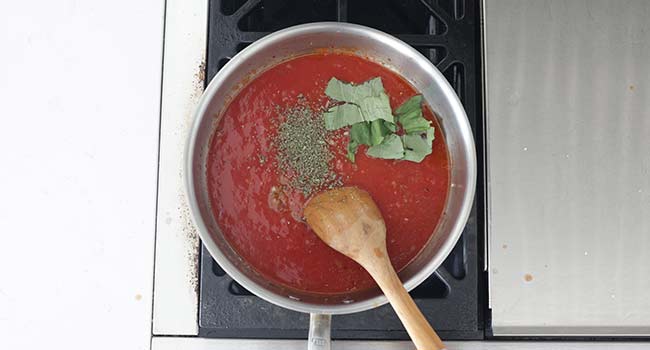
Simmer: I stir everything well, then reduce the heat and let the sauce gently simmer for about 20 minutes. This allows the flavors to deepen and the sauce to thicken slightly.
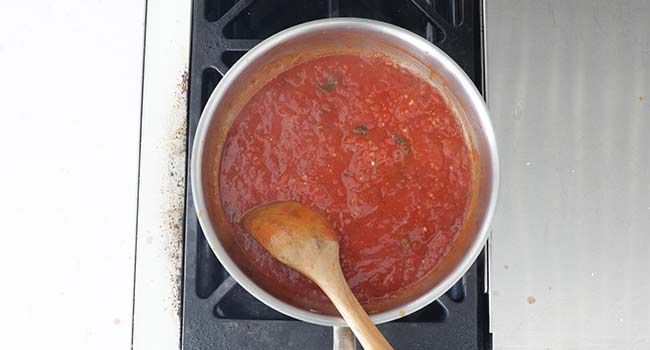
Serve: Finally, I taste the sauce and adjust the seasonings if needed, then serve it warm with my favorite dishes (or let it cool and store it for later).
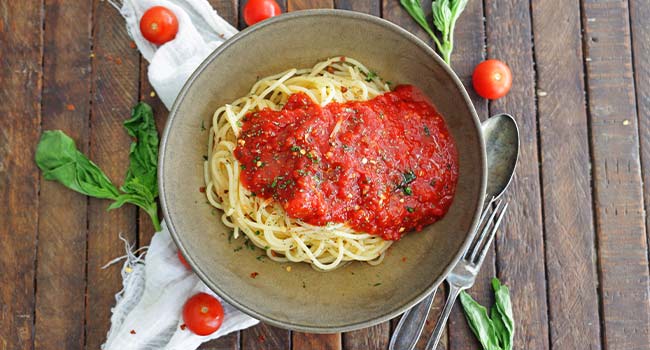

Chef Tips + Notes
When making marinara sauce from scratch, you must use the highest-quality ingredients. There are so few ingredients here that the quality of the items can make or break your sauce. You may need more money or extra time picking out the best ingredients at the farmers market, but I promise it’s worth it.
- Use fresh tomatoes instead of canned: The best tomatoes for marinara are ripe San Marzano, Roma (plum), or vine-ripened tomatoes. Blanch 10 to 12 of the fresh tomatoes of your choice in boiling water for 30 to 60 seconds, then immediately transfer them to an ice bath. Peel off the skins, remove the cores, and crush them by hand before adding them to the sauce.
- Don’t burn the garlic: Burnt garlic can make the sauce taste bitter. If you notice the garlic is browning too quickly, immediately remove the pan from the heat and lower the temperature before continuing.
- Adjust the flavors to your liking: You can always add a pinch of red pepper flakes for heat, a bay leaf or a sprig of thyme for complexity, or even a splash of balsamic vinegar to enhance the sweetness. If the sauce is too acidic or tangy, stir in a pinch of sugar to balance the acidity.
- The consistency of the sauce is up to you: I like this sauce’s chunky and rustic texture, but you can use an immersion blender to puree it if you prefer a smooth consistency.
- Make it in the slow cooker: To make marinara sauce in the slow cooker, sauté the onions and garlic in a pan as directed, then transfer them to the slow cooker. Add the tomatoes, herbs, and seasonings, cover with a lid, and cook on low for 6 to 8 hours or on high for 3 to 4 hours.
Serving Suggestions
We usually serve this marinara sauce with spaghetti and meatballs for family dinners, but it’s perfect for most other pasta dishes. When I’m craving an Italian dinner in a hurry, I’ll toss the leftover sauce with cooked penne, rigatoni, bucatini, or any other pasta I have on hand and top it with more basil and grated Parmigiano Reggiano.
Pasta aside, marinara sauce is a perfect complement for even more classic Italian meals. Think eggplant or chicken parmigiana or a perfectly messy meatball sub. It’s also a great alternative to pizza sauce on homemade pizza.
And when it’s my turn to host the party, I’ll surround platters of mozzarella sticks, arancini, garlic bread, homemade calamari, and cheesy bread with bowls of marinara sauce for dipping.
Make-Ahead and Storage
Make-Ahead: The sauce can be kept warm in the covered saucepan over low heat for up to an hour before serving.
How to Store: Transfer the cooled sauce to an airtight container or mason jar and refrigerate it for up to 5 days or freeze it for up to 3 months. If freezing, leave some space at the top of the container for expansion. Thaw the leftovers in the fridge overnight before reheating.
How to Reheat: Reheat the marinara sauce on the stovetop over low heat, stirring occasionally, until warmed. You can also microwave it in 30-second intervals, stirring in between.
More Tomato Sauce Recipes

Homemade Marinara Sauce Recipe
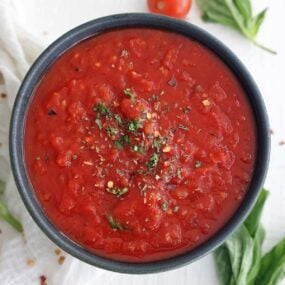
Ingredients
- ¼ cup olive oil
- 4 finely minced garlic cloves
- ½ cup peeled and small-diced yellow onion
- 28 ounce can San Marzano tomatoes, hand crushed
- 4 to 5 fresh basil leaves
- 1 teaspoon dry oregano, optional
- 1/2 teaspoon coarse salt
Instructions
- Add the olive oil to a medium-sized sauce pan and heat over low-medium heat.
- Place in the garlic and onions, gently season with salt, and sauté while occasionally stirring for 10 to 12 minutes.
- Once browned, add in the hand-crushed tomatoes, basil leaves, optional oregano (I like to), and ½ teaspoon of salt.
- Stir together and simmer over low to medium heat for 20 minutes.
- Serve.


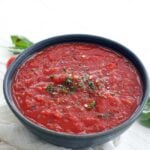

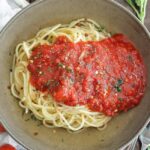

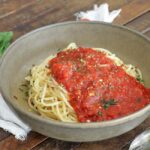
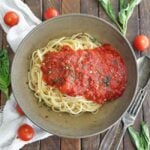
Homemade Marinara Sauce Recipe